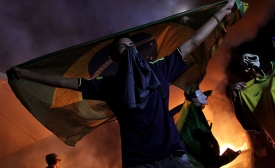fifa

As the 2014 FIFA World Cup kicks off to fanfare and protest, we see how soccer and sports diplomacy can improve the image and soft power of Brazil.

The lasting legacy of the 2014 FIFA World Cup will not be the grand infrastructure or (questionable) economic boom promised by their FIFA overlords.

As FIFA's global sponsors work to maximize their brand engagement prior to next week's World Cup, host country Brazil and 2022 host Qatar struggle to overcome negative press and poorly-planned branding strategies.
If you haven’t heard the song by now, you soon will; Mas Que Nada by Sergio Mendes and Brasil 66 will be a big part of this summer’s soundtrack. As the World Cup in Brazil fast approaches, the 1963 Jorge Ben number is on tv, in adverts, cafes, bars—in fact, everywhere. One translation of the song’s title is “whatever”, a perfect country slogan for a track that seems to personify the stereotypical view many of us have of Brazil and Brazilians.
A disclosure by British weekly The Sunday Times of millions of documents allegedly revealing massive Qatari vote buying in the Gulf state's successful bid to host the 2022 World Cup could rejigger the Gulf's fragile balance of power, reverse hopes that Qatar would initiate significant social change in the region, and return the worst corruption crisis in global soccer governance to the top of the agenda.
FIFA’s investigative report and related documents, which were obtained by The New York Times and have not been publicly released, raise serious questions about the vulnerability of the World Cup to match fixing. The tournament opens June 12 in Brazil. The report found that the match-rigging syndicate and its referees infiltrated the upper reaches of global soccer in order to fix exhibition matches and exploit them for betting purposes.
Manager Roy Hodgson is due to announce his England World Cup squad later and thousands of British fans are expected to make the journey to Brazil for the tournament.
Members of the Russian parliament have written to FIFA asking it to consider excluding Jurgen Klinsmann’s USA team from the 2014 World Cup finals in Brazil. Alexander Sidyakin and Michael Markelov, two members of the Duma, addressed their concern about the “U.S.’s military aggression against several sovereign states” and named Yugoslavia, Iraq, Libya and Syria among those suffering from U.S. aggression.







